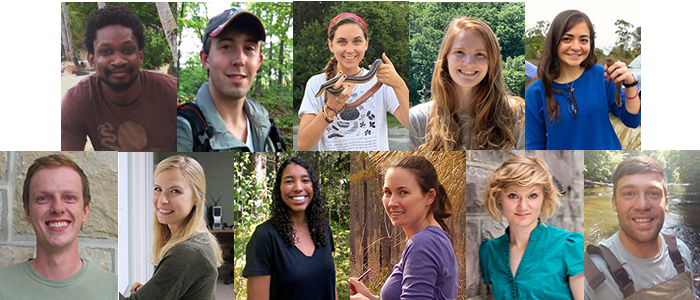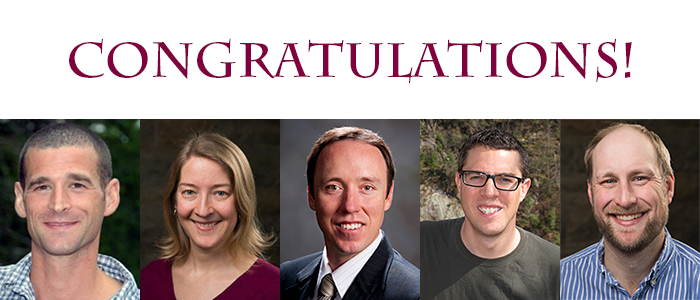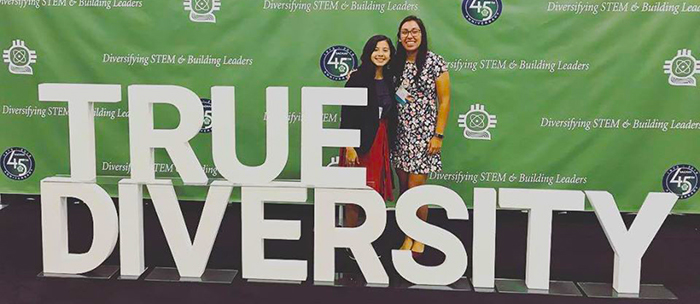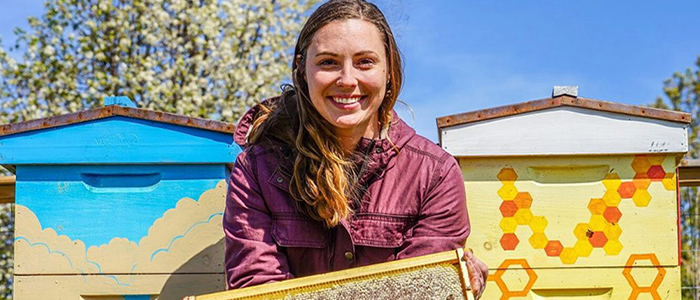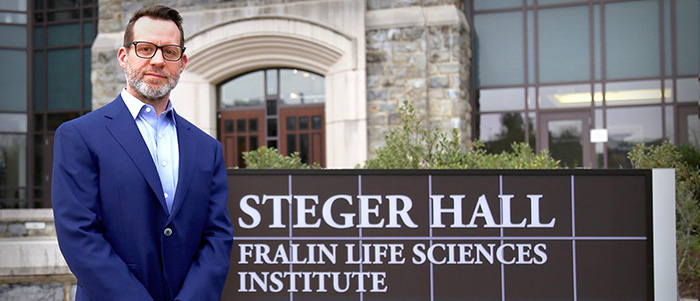[vc_row][vc_column][vc_column_text]
From VT News | August 11, 2020
William Hopkins will join the Fralin Life Sciences Institute at Virginia Tech as associate executive director, effective immediately.
In his new role, Hopkins will assist Matt Hulver, executive director, and his leadership team as they develop and implement the vision and strategic directions for the Fralin Life Sciences Institute to tackle grand life science challenges at the interface of the environment and the human condition.
Hopkins will assist Hulver in identifying strategic opportunities that leverage and capitalize on existing expertise and infrastructure at Virginia Tech. Hopkins is also the founding director of the Global Change Center and the director of the Interfaces of Global Change Interdisciplinary Ph.D. program.
“Hopkins is a dynamic and compelling leader whose passion for the institute’s research and expertise in tackling global change will energize faculty, students, and staff, ” said Hulver.
The Fralin Life Sciences Institute at Virginia Tech a strategic university investment committed to improving the human condition by supporting life sciences research, education, and outreach across Virginia Tech and the world.
“Since joining Virginia Tech about 15 years ago, I have witnessed the positive impact that our investment institutes have on the research enterprise, experiential learning, graduate training, and translational outcomes. I’ve seen these impacts firsthand, as the Fralin Life Sciences Institute has had a tremendous influence on my own career and the careers of dozens of my colleagues,” said Hopkins. “I am excited to take on this new role where I can give back and help support an organization focused on some of the most pressing global challenges of our time, such as climate resiliency, invasive species, and infectious diseases, with the institute’s talented faculty and staff.”
Hopkins’ specific duties will also include identifying opportunities for fostering an inclusive environment and attracting faculty from diverse backgrounds to the life sciences at Virginia Tech, fostering faculty collaborations within and among the centers as well as with other faculty teams, pursuing philanthropic opportunities with the Advancement office, and serving as a member of the Fralin Life Sciences Institute Stakeholders Committee.
Hopkins’ research program at Virginia Tech, which focuses on physiological ecology, conservation, and wildlife ecotoxicology, will be moving to Steger Hall. Hopkins studies how wildlife respond physiologically and behaviorally to global threats, including climate change, habitat loss, pollution, and pathogens. His current active extramural research funding exceeds $2.2 million and current sources include the National Science Foundation, multiple state and federal agencies, and foundation grants.
Hopkins has published nearly 200 peer-reviewed manuscripts and book chapters on subjects pertaining to wildlife conservation, pollution, and physiological ecology.
The Global Change Center will also be moving to be administratively housed at Steger Hall. This will consolidate current operations from Latham Hall, Fralin Hall, and Litton Reaves to greatly enhance the center’s efficiency.
At Virginia Tech, Hopkins has taught undergraduate courses in Wildlife Biology; Tropical Ecology and Conservation; and Ecology, Evolution, & Conservation in the Galapagos. At the Graduate level, he has taught Vertebrate Physiological Ecology, the Global Change Seminar courses, and the Global Change Capstone course.
Hopkins is a professor in the Department of Fish and Wildlife Conservation in the College of Natural Resources and Environment at Virginia Tech. He holds additional adjunct associate professor appointments with the University of Georgia’s Odum School of Ecology, the University of Tennessee, and Purdue University. He has received the Alumni Award for Excellence in Research, the Outstanding Graduate Mentor Award from the Graduate School, and twice received the Outstanding Faculty Award for undergraduate teaching, mentoring, and advisement from his home department.
Hopkins is passionate about using the best available science to inform public policy and sound decision-making. He has served as a member of three National Academies of Sciences, Engineering, and Medicine committees on contentious issues related to coal mining, water resources, and rural health in Appalachia. And, Hopkins recently chaired a fourth National Academies committee focused on data quality in the federal government.
He has been a key scientific contributor to five of the U.S. Department of Interior’s Natural Resource Damage Assessment and Restoration (NRDAR) cases, including those surrounding the B.P. oil spill, the T.V.A. ash spill (Kingston, Tennessee), the Olin Superfund site (Saltville, Virginia), the South River mercury spill (Waynesboro, Virginia), and the Los Alamos National Lab in New Mexico. In all five NRDAR cases, he worked effectively with multiple stakeholder groups, including industry, state government, federal government, local concerned citizens, NGOs, private consultants, and other academic institutions. He also regularly serves in advisory capacities at the local, state, national, and international levels on issues pertaining to waste management, water resources, sustainability, and the global decline of amphibians.
CONTACT:
Kristin Rose Jutrus
(540) 231-6614
[/vc_column_text][/vc_column][/vc_row][vc_row][vc_column][vc_separator][/vc_column][/vc_row][vc_row][vc_column][/vc_column][/vc_row][vc_row][vc_column][vc_separator style=”shadow”][/vc_column][/vc_row]

